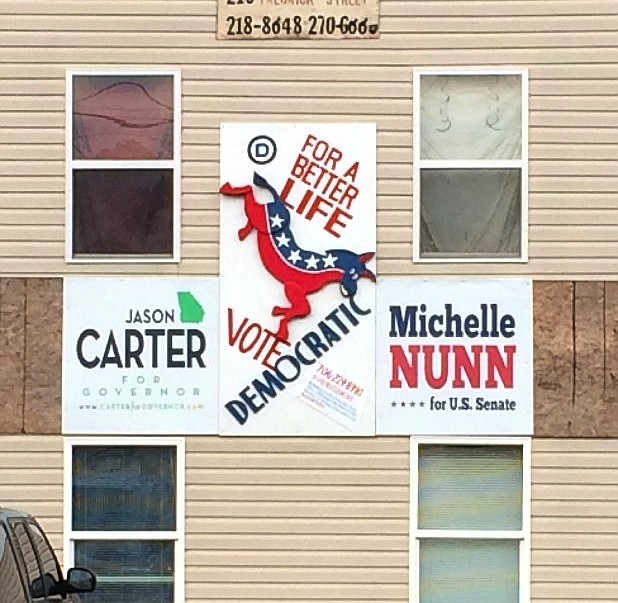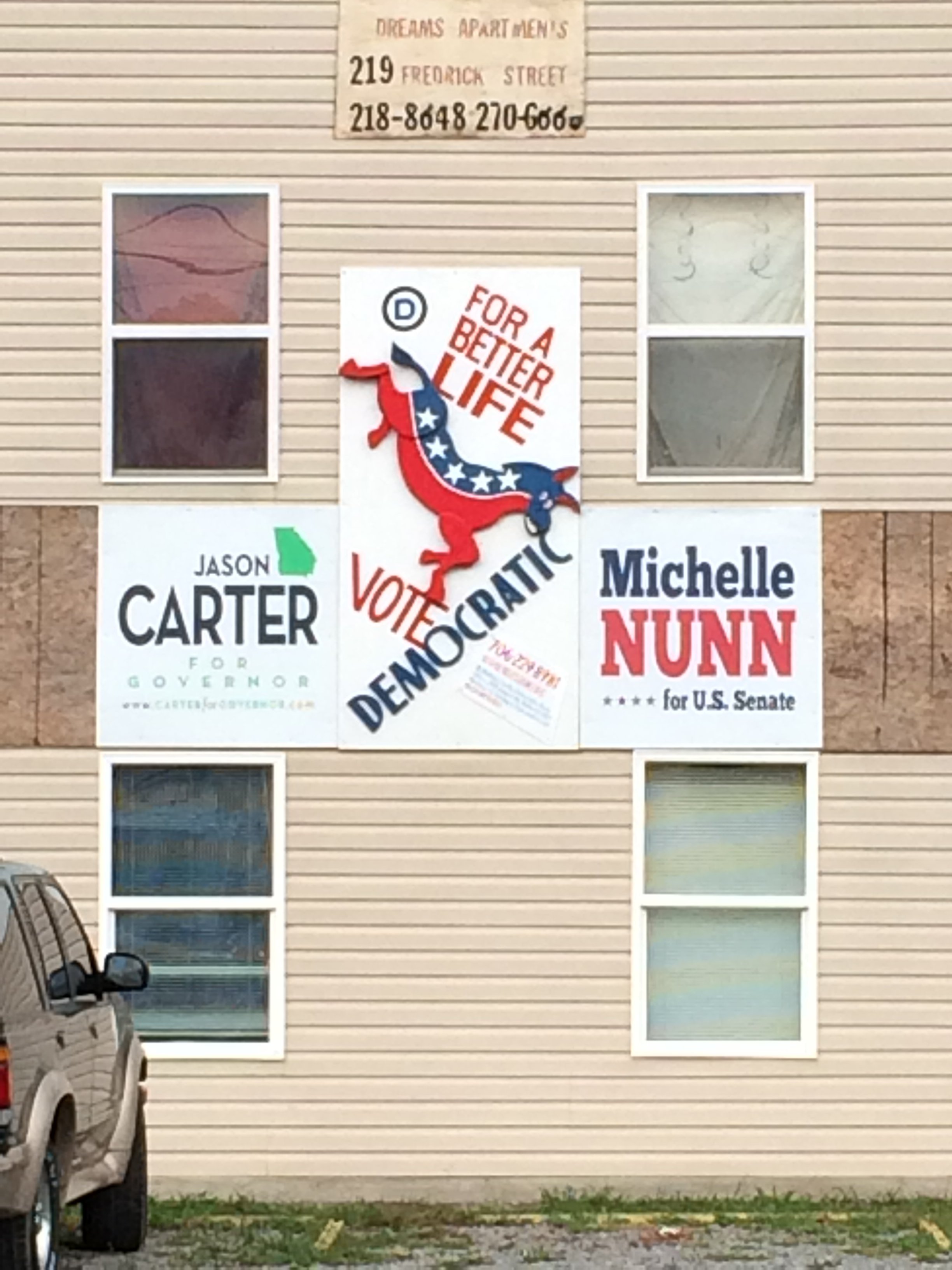Michelle Nunn's new TV spot is like most political ads.
A nice-looking woman in a blue dress and a nice-looking woman in a red dress and a nice-looking woman in a sports coat look into the camera, smile and speak nice platitudes: Small business is nice, and families are nice, and Michelle Nunn is nice.
The background music is soothing, and everyone is happy, and the future is bright. Released on Wednesday, it's a normal political ad. Except that it's not -- not in Georgia.
All three women are Hispanic. And they speak only Spanish. So does Nunn, who enters at the end of the 30-second spot in the form of B-roll and a disembodied voice.
"Soy Michelle Nunn y apruebo este mensaje," she says.
Translation: I'm Michelle Nunn, and I approve this message.
With the midterm election just two days away, the ad doesn't seem like a big deal. Just another politician's face in the endless cycle of Democratic and Republican spots popping up on your TV between the shows you actually want to watch.
VOTER GUIDESee a list of candidates, proposed amendments and sample ballots at timesfreepress.com/voterguide2014.
But Nunn's Spanish-speaking advertisement signals the Peach State's looming demographic shift. Jerry Gonzales, the executive director of the nonpartisan Georgia Association of Latino Elected Officials, said this is the first time a prominent statewide candidate has released an ad aimed at Hispanic voters.
"That was historic," he said.
Nunn's race against Republican David Perdue for retiring Sen. Saxby Chambliss' seat is one of the most hotly contested competitions in the midterm elections. Pollsters say Perdue has a slight edge, as is almost always the case for the GOP in Georgia. But Nunn isn't far behind, and an upset Tuesday is possible.
The country's liberal leaders are praying for one. With several Democratic incumbents on the ropes -- including those in Alaska, Arkansas, Colorado and Louisiana -- a Nunn victory seems necessary for her party to maintain control of the Senate.
And with that race potentially coming down to a couple thousand votes, the Hispanic voice could tip the scales. Which is to say that Georgia's Latino community could prove the difference between Nunn and Perdue. So a North Georgia community like Dalton could influence the national political climate.
America Gruner, the president of the Coalition of Latino Leaders in that city, has prepared for Tuesday's election by holding voter registration and "get out the vote" events for months. On Oct. 16, she held a candidate forum at her office, located inside the Delray Farms grocery store.
The event featured representatives from Nunn's and Perdue's campaigns, as well as Dalton's mayoral candidates and members of Gov. Nathan Deal's and Democratic gubernatorial candidate Jason Carter's teams.
With its strong carpet industry, Dalton is an example of the Latino community's growth in Georgia over the last two decades.
In 1990, Whitfield County featured 2,000 Hispanic residents. By 2000, that number was up to 18,000 -- a 700 percent increase. By 2010, there were 32,000 Hispanic in Whitfield.
Statewide, the population has also increased. In 2000, 430,000 Hispanic people lived in Georgia. Twelve years later, that number had more than doubled to 900,000.
Voter registration, too, has gone up, though the figures remain relatively small. According to the National Council of La Raza, a Hispanic civil rights organization, only 26,000 Latino people in Georgia were registered to vote in 2000. By 2012, that number was up to 140,000.
And it continues to grow. Gonzales estimates that about 210,000 Hispanics are registered to vote in Georgia today. That figure is not huge -- just about 4 percent of all registered voters in the state.
Still, Gonzales says, that represents exponential growth. All year, he has been calling potential voters, knocking on their doors, advertising on their Spanish-language radio stations and showing up to their naturalization ceremonies, asking them to register to vote.
Compared to the rest of the state, Gonzales concedes, the numbers are still small. But 4 percent can be a big deal. Four percent can change an election.
Of course, it's hard to know exactly how the Hispanic vote in Georgia will swing. Nationally, Latinos tend to favor Democrats (about 70 percent voted for Barack Obama in 2012). But experts suggest this is changing, at least a little bit.
The reason? Immigration reform. Or a lack thereof. After Obama announced this year that he would not issue executive orders on reforms until at least after the midterms, according to the Pew Research Center, support for Democrats in the Latino community waned.
Of course, the GOP has also blocked such reform.
"Hispanics didn't expect a lot from Republicans," said Charles Bullock, a political science professor at the University of Georgia. "They had high hopes for Obama. ... Their hopes are dashed."
But Gonzalez said he is not concerned with which way Hispanics vote, as long as they vote.
"Once Latinos are educated and informed about how tight the election is and how much power the Latino community actually has," he said, "people become excited and engaged. Not necessarily for a specific candidate, but more to make sure our community has been respected.
"Respect is a huge issue for the Latino community."
Contact staff writer Tyler Jett at tjett@timesfreepress.com or at 423-757-6476.

